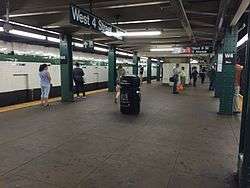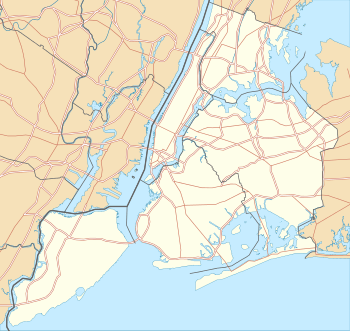West Fourth Street–Washington Square (New York City Subway)
| West Fourth Street–Washington Square | |||||||||||||
|---|---|---|---|---|---|---|---|---|---|---|---|---|---|
| New York City Subway rapid transit station | |||||||||||||
|
IND Eighth Avenue Line platforms | |||||||||||||
| Station statistics | |||||||||||||
| Address |
West Third Street & Sixth Avenue New York, NY 10014 (main station entrance) | ||||||||||||
| Borough | Manhattan | ||||||||||||
| Locale | Greenwich Village | ||||||||||||
| Coordinates | 40°43′54″N 74°00′03″W / 40.731682°N 74.000945°WCoordinates: 40°43′54″N 74°00′03″W / 40.731682°N 74.000945°W | ||||||||||||
| Division | B (IND) | ||||||||||||
| Line |
IND Sixth Avenue Line IND Eighth Avenue Line | ||||||||||||
| Services |
A B C D E F M | ||||||||||||
| Transit connections |
| ||||||||||||
| Structure | Underground | ||||||||||||
| Levels | 2 | ||||||||||||
| Platforms |
4 island platforms (2 on each level) cross-platform interchange | ||||||||||||
| Tracks | 8 (4 on each level) | ||||||||||||
| Other information | |||||||||||||
| Opened |
September 10, 1932[1] (upper level) January 1, 1936 (lower level) | ||||||||||||
| Accessible |
| ||||||||||||
| Wireless service |
| ||||||||||||
| Traffic | |||||||||||||
| Passengers (2015) |
14,147,148[3] | ||||||||||||
| Rank | 20 out of 422 | ||||||||||||
| Station succession | |||||||||||||
| Next north |
14th Street (8th Ave): A 14th Street (6th Ave local): F 34th Street–Herald Square (6th Ave express): B | ||||||||||||
| Next south |
Spring Street (8th Ave local): A Canal Street (8th Ave express): A Broadway–Lafayette Street (6th Ave): B | ||||||||||||
|
| |||||||||||||
| Next |
14th Street (8th Ave): A 34th Street–Herald Square (6th Ave): B | ||||||||||||
| Next |
World Trade Center (8th Ave local): no regular service none; elevator at World Trade Center out of service: E Fulton Street: A Broadway–Lafayette Street (6th Ave): B | ||||||||||||
| |||||||||||||
| |||||||||||||
|
| |||||||||||||
|
West 4th Street Subway Station (IND) | |||||||||||||
| MPS | New York City Subway System MPS | ||||||||||||
| NRHP Reference # | 05000223[4] | ||||||||||||
| Added to NRHP | March 30, 2005 | ||||||||||||
West Fourth Street–Washington Square is an express station and transfer stop on the IND Sixth Avenue and IND Eighth Avenue Lines of the New York City Subway, located at the intersection of West Fourth Street and Sixth Avenue in Greenwich Village, Manhattan. It is served by:
- A, D, E, and F trains at all times;
- B and M trains on weekdays;
- C train at all times except late nights
History
West Fourth Street was one of the 28 stations opened on September 10, 1932, as part of the first line of the Independent Subway System (IND), the Eighth Avenue Line, from Chambers Street to Inwood–207th Street.[1][5] At the time, only the upper level was used, with service on the lower level beginning in January 1936 with service from the Eighth Avenue Line to Second Avenue; through service on the Sixth Avenue local tracks began in December 1940. The Sixth Avenue express tracks were built later and were put into through service on November 27, 1967; prior to then, the express tracks here and at 34th Street–Herald Square were used as terminal tracks only.
The station was named West Fourth Street as opposed to merely Fourth Street because the planners of the Independent Subway System believed there would be confusion between this station and South Fourth Street, a proposed transfer station on the never-built IND Second System in Williamsburg, Brooklyn.[6]


Station layout
| G | Street level | Exit/entrance |
| B1 | Mezzanine | Fare control, station agents |
| B2 | Northbound local | ← ← |
| Island platform, doors will open on the left, right | ||
| Northbound express | ← | |
| Southbound express | → | |
| Island platform, doors will open on the left, right | ||
| Southbound local | → → | |
| B3 | Mezzanine | Transfer between directions/lines |
| B4 | Northbound local | ← ← |
| Island platform, doors will open on the left, right | ||
| Northbound express | ← ← | |
| Southbound express | → → | |
| Island platform, doors will open on the left, right | ||
| Southbound local | → → | |
West Fourth Street station was built by the IND as the major transfer point between its two Manhattan trunk lines. It can be considered the "heart" of the IND system as it is the location of the zero point on the IND chaining. It is a bi-level station with a connecting concourse between the two platform levels. The Eighth Avenue Line occupies the upper level, while the Sixth Avenue Line uses the lower level. Both levels use identical platform arrangements–two island platforms between four tracks, allowing for cross-platform interchanges between local and express trains in each direction.
There are two fare control areas, one at each end of the station. Both lead directly to the Eighth Avenue Line on the upper level platforms; access to the Sixth Avenue Line on the lower level is via stairs and elevators from the upper level and/or the full-length mezzanine between the two levels. Several escalators are present, which go directly between one of the lower level platforms to its corresponding upper level platform. The elevators, added in April 2005 to make the station ADA-accessible, provide access to both levels and to the mezzanine.[7] This massive station has only four exits despite its size, which illustrates the station's main purpose as a major transfer point between trains on both IND trunk lines.
South of this station, at the curve from under Houston Street to Sixth Avenue on the IND Sixth Avenue Line (lower level), a bellmouth merges with the Queens-bound local track.[8]
Exits
The station does not have an exit to Fourth Street itself anymore, though an exit formerly existed there.[9] The northern exits are on the northern side of 6th Avenue and Waverly Place. Two staircases go up to the northeast corner, both built into alcoves of stores, and one to the northwest corner. The southern exits are at West Third Street, on the east and west sides of 6th Avenue.[10]
- Two to the northwest corner (within building), one to the northeast corner (within building) of Sixth Avenue and Waverly Place[10]
- One to the east side of Sixth Avenue north of Waverly Place[10]
 One elevator and staircase on the northeast corner of Sixth Avenue and West Third Street[10]
One elevator and staircase on the northeast corner of Sixth Avenue and West Third Street[10]- One on the west side of Sixth Avenue at West Third Street[10]
There are also four additional closed exits at the center of the station: two at Washington Place, and two at West 4th Street itself.[9]
Nearby points of interest
References
- 1 2 New York Times, List of the 28 Stations on the New Eighth Ave Line, September 10, 1932, page 6
- ↑ "NYC Subway Wireless – Active Stations". Transit Wireless Wifi. Retrieved 2016-05-18.
- ↑ "Facts and Figures: Annual Subway Ridership". Metropolitan Transportation Authority. Retrieved 2016-04-18.
- ↑ "NPS Focus". National Register of Historic Places. National Park Service. Retrieved January 25, 2012.
- ↑ Crowell, Paul (September 10, 1932). "Gay Midnight Crowd Rides First Trains In The New Subway: Throngs at Station an Hour Before Time, Rush Turnstiles When Chains are Dropped". New York Times. Retrieved 8 November 2015.
- ↑ Pollak, Michael (2008-09-12). "F. Y. I.". The New York Times. Retrieved 2009-08-05.
- ↑ Chan, Sewell (October 29, 2005). "New Elevators in Subways Are Delayed". The New York Times. Retrieved 13 September 2015.
- ↑ https://www.youtube.com/watch?v=q0Es5eOJe0E The provision for a line that was never built can be seen towards the left, at the 2:40 mark into the video, just before the train enters the West Fourth Street station.
- 1 2 "Review of the A and C Lines" (PDF). Metropolitan Transportation Authority. December 11, 2015. Retrieved 19 January 2016.
- 1 2 3 4 5 "MTA Neighborhood Maps: West VIllage" (PDF). Metropolitan Transportation Authority. 2015. Retrieved 13 September 2015.
External links
| Wikimedia Commons has media related to West Fourth Street – Washington Square (New York City Subway). |
- nycsubway.org – IND 8th Avenue: West Fourth Street/Washington Square
- nycsubway.org – IND 6th Avenue: West Fourth Street/Washington Square
- Station Reporter – A Lefferts
- Station Reporter – A Rockaway
- Station Reporter – B Train
- Station Reporter – C Train
- Station Reporter – D Train
- Station Reporter – E Train
- Station Reporter – F Train
- Station Reporter – M Train
- Waverly Place entrance from Google Maps Street View
- entrance north of Waverly Place from Google Maps Street View
- West Third Street entrance from Google Maps Street View
- Mezzanine from Google Maps Street View
- Upper level from Google Maps Street View
- Lower level from Google Maps Street View





